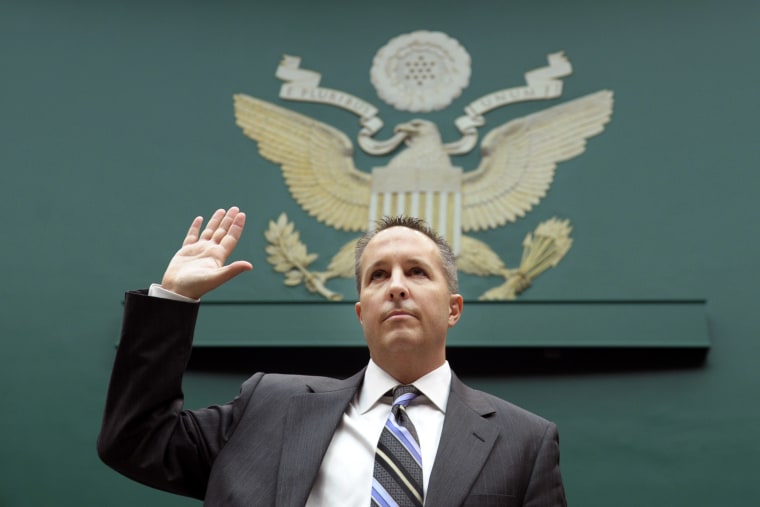Fourteen people have been charged with offenses ranging from mail fraud to second-degree murder for their alleged involvement in the manufacturing and dispensing of tainted medicine linked to a 2012 meningitis outbreak that killed 64 people.
The 131-count indictment, unsealed Wednesday, is the result of a two-year multi-agency criminal investigation into the New England Compounding Center (NECC), a Massachusetts-based pharmacy whose owners and employees are accused of knowingly mixing steroid shots contaminated with black mold and systematically covering up the crimes to regulators.
It marks the largest criminal case ever brought on U.S. soil over contaminated medicine.
"As alleged in the indictment, these employees knew they were producing their medication in an unsafe manner and in insanitary conditions, and authorized it to be shipped out anyway, with fatal results," said Attorney General Eric Holder Wednesday in a statement. "With the indictment and these arrests, the Department of Justice is taking decisive action to hold these individuals accountable for their alleged participation in grievous wrongdoing.”
RELATED: Meningitis-linked pharmacy was unsanitary
The most serious charges were brought against Barry Cadden, a co-founder of NECC, and Glenn Adam Chin, a pharmacist responsible for managing the “clean room” where sterile drug products are produced. They are charged with 25 acts of second-degree murder under the Racketeer Influenced and Corrupt Organization Act (RICO), and face up to life in prison if convicted on all counts. Other charges in the lengthy indictment include contempt, the sale of misbranded drugs, conspiracy to defraud the federal government, and mail fraud.
Over 751 patients in 20 states were diagnosed with a fungal infection after receiving injection of NECC’s preservative-free methylprednisolone acetate (MPA), a steroid injection routinely used to treat back pain, according to the U.S. Centers for Disease Control and Prevention. Of those 751 patients, 64 in nine states died.
“Actions like the ones alleged in this case display not only a reckless disregard for the federal health and safety regulations, but also an extreme and appalling indifference to human life,” said Acting Associate Attorney General Stuart Delery during a press conference Wednesday. “Production and profit were prioritized over safety,” added U.S. Attorney Carmen Ortiz for the District of Massachusetts.
In an eerie moment while Ortiz was addressing the victims, Wednesday’s press conference was briefly interrupted when an official flanking her collapsed. Ortiz later said her colleague was stable and feeling much better.
RELATED: How Obamacare reduces racial disparities in health care
The indictment alleges that NECC's pharmacists failed to properly sterilize their drugs, test their drugs, and clean the room where their drugs were produced, among other claims. Additionally, when mold and bacteria was detected in NECC's clean room, senior pharmacists failed to stop production, investigate the source of contamination, or consult with a competent professional, as they were required to do. NECC also approved the use of expired ingredients and concealed that it was doing so, the indictment alleges, sometimes using celebrity names on fake prescriptions to dispense drugs in bulk without being detected by FDA regulators.
Following the meningitis outbreak’s discovery, NECC ceased operations and surrendered its license to the Massachusetts Board of Registration in Pharmacy. The company also filed for bankruptcy, whereupon its shareholders were told not to transfer assets. Yet Wednesday’s indictment also charges Carla Conigliaro, the majority shareholder of NECC, and her husband, Douglas Conigliaro, with transferring approximately $33.3 million to eight different bank accounts opened after the pharmacy declared bankruptcy.
